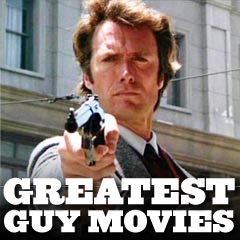
|
![]()
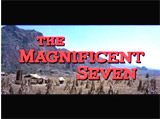
|
The Magnificent Seven (1960) Also, Return of the Seven (1966), Guns of the Magnificent Seven (1969), and The Magnificent Seven Ride! (1972), and remake The Magnificent Seven (2016) Director John Sturges' very popular, shoot-em-up western, with a memorable, Oscar-nominated score by Elmer Bernstein, was a westernized, 'updated' remake and adaptation of Akira Kurosawa's Japanese film epic The Seven Samurai (1954) about Samurai warrior-swordsmen that defended a 14th century village. The box-office "feel-good" hit inspired three sequels (1966, 1969, 1972) and a remake in 2016, and a late 1990s TV series. The ensemble film was mostly a character study of the seven demythologized gunslingers, all basically drifters who came together to serve as a vigilante force to protect a terrorized Mexican town and its oppressed peasant villagers from invading and pillaging bandits, led by gold-toothed Calvera (Eli Wallach). The "magnificent seven" group of low-paid, misfit, macho, mercenary gun-slinging American outlaws included:
There was a mixed bag of motives for each of the gunfighters to accept the job - greed or fortune seeking (thoughts of a possible treasure), a chance at employment, to seek sanctuary or protection from the law, moral and social conscience issues, and just plain adventurism. In one of the film's most impressive sequences, silent but deadly knife-thrower cowboy Britt (James Coburn) was challenged to two knife-versus-gun, fast-draw face-offs with hot-headed, haughty gunman Wallace (Robert J. Wilke); during their second deadly contest, Wallace ended up the loser with a knife in his chest - unable to draw faster than Britt. Immediately afterwards, Chris asked to recruit Britt into their team: ("Can I have a word with you?") and shortly later Britt gave his consent. During preparations for an upcoming showdown with the outlaws, the 'Seven" trained the villagers to defend themselves; they taught them how to properly pull a trigger on a gun or rifle, and had them build a fortifications-rock wall and an entrapping drop-net. Chico discovered the reason for the absence of women when he was being spied upon by one of the local peasant girls named Petra (Rosenda Monteros) as he was mock bull-fighting; he learned the females were deliberately hidden away to prevent them from being raped by the group of seven gunslingers; Chris assured them that they were defending them, and ordered them brought back to the village; soon after, Chico and Petra fell in love with each other although it was frowned upon by her father. There were two initial skirmishes with members of Calvera's marauding gang before the final confrontational shoot-out. In the first dramatic and deadly scene with the bandits, Calvera rode into the village with members of his marauding gang of 40 men (his approach was signaled by sentries along the way); he was undeterred by the sole presence of Chris, Britt and Vin who greeted him. The townsfolk and gunslingers opened fire on the banditos, and used the nets to entrap them; after they fled, shortly later, the bandits counted up eleven of their gang dead. After scaring off the marauders, the villagers were exultant about their newfound courage ("There are other villages...that don't sting the way we do"), but prematurely believed the threat was over when other gunfire erupted. Chico reported back to the group that Calvera would attack again; some of the villagers urged the gunslingers to leave so that the killing would stop: "We're surrounded. Outnumbered ....Go away. All of you. Get on your horses and go. Let Calvera have the food. Give him what he wants. At least we'll be alive"; Chris refused to give up because of their "contract" to aid the villagers, and almost everyone agreed with him; however, they realized that they had miscalculated Calvera's determination: "We figured to raise the ante just enough to make Calvera play someplace else. We figured wrong." In a second surprise raid, Calvera and his men infiltrated into the village with the help of Sotero (Rico Alaniz) - one of the traitorous and fearful villagers; when the Magnificent Seven returned, they were surrounded at gunpoint by Calvera's men. They agreed to give up their guns and leave town in exchange for their lives. After being escorted from the village, the gunslingers were given back their guns. Except for Harry, most of the gunslingers decided to return for the film's climactic shoot-out; the first to be fatally shot was Harry who had a change of heart and came back - he attempted to save Chris' life and died as he was assured that there were precious stones buried in the mountains that he had fought for ("Gold. Sacks of it"); the next to die was Lee (who saved several captive villagers from their captors but lost his life), and then the heroic Britt; Bernardo died in the arms of three children that he had befriended and reminded them to look at their fathers ("You see? I told you. You see your fathers?") - during the fight, the villagers were emboldened by the group's courage against the odds and joined in with brooms, chairs, shovels and whatever weapons they could find. During Calvera's death scene after being shot by Chris, he asked: "You came back - for a place like this. Why? A man like you. Why?" but he didn't receive an answer before expiring; the few remaining banditos fled from the village. Afterwards, only three of the seven had survived (Chico, Chris, and Vin); as the three gunslingers departed, the village elder or Old Man (Vladimir Sokoloff) wisely observed that only the village farmers had won, not the gunslingers: "Only the farmers have won. They remain forever. They are like the land itself. You helped to rid them of Calvera, the way a strong wind helps rid them of locusts. You are like the wind - blowing over the land and passing on. Vaya con dios." Only Chico decided to turn back and remain in the village to marry Petra; the film concluded with Chris' pessimistic words to Vin as they glanced at the gravesites of their fallen companions: "The Old Man was right. Only the farmers won. We lost. We always lose."
"If he rides in with no idea of the reception we can prepare for him, I promise you we'll all teach him something about the price of corn."
The final stand-off to defend the village between the "Magnificent Seven" and Calvera's gang. |
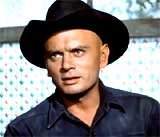 Chris Adams (Yul Brynner) 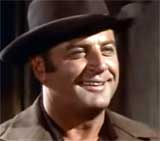 Harry Luck (Brad Dexter) 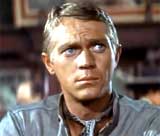 Vin Tanner (Steve McQueen) 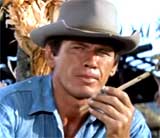 Bernardo O'Reilly (Charles Bronson) 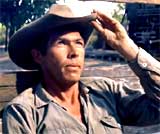 Britt (James Coburn) 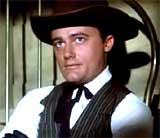 Lee (Robert Vaughn) 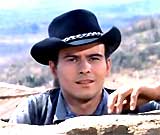 Chico (Horst Buchholz) 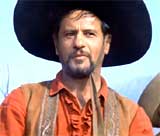 Mexican Bandit Leader Calvera (Eli Wallach) 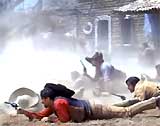 Climactic Shoot-Out 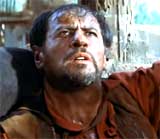 The Lingering Death of Calvera Asking Chris: "Why? A man like you. Why?" 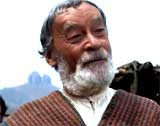 The Old Man's Wise Words As the Three Surviving Gunslingers Departed |
|||||||||||||||

|
-- And almost all of the other Bond films to follow! Director Terence Young's first of the official James Bond series of action-packed spy thrillers played a key role in establishing the Bond character as a recognizable icon in popular American contemporary culture. It debuted with Sean Connery's introduction in a casino: "Bond, James Bond" and also the 'gun-barrel' view during the opening credits, and the ridiculous names for Bond girls, etc. It was also the first of fourteen films to feature Lois Maxwell as M's secretary Miss Moneypenny who frequently bantered with Bond. All of the films had clever opening title sequences and trademark theme music, sexy and beautiful women, great diabolical villains, exotic, international locales, the calm manner and witty, subtle humor and repartee of the mythic hero 007, violence, terrific action sequences, stunts and chase scenes, narrow escapes, gimmicks, and great cinematography. Its predictable formula starred the debonair, dashing and charming British "Secret Agent 007," James Bond (Sean Connery) (portrayed over the years by numerous dashing actors), with great taste in clothes, wine, food, and exotic, sexy women. John Barry's distinctive theme music was also featured. This film established many of the main elements and templates for the Bond spy films to come, i.e., Bond's Walther PPK. It debuted the recurring villainous organization - SPECTRE (SPecial Executive for Counter-intelligence, Terrorism, Revenge, Extortion). In the film's central plot, SPECTRE's operative named Dr. Julius No (Joseph Wiseman) - a reclusive and menacing half-Chinese (with metal prosthetic hands), was noted for unusual murders (via 'three blind mice' assassins, a deadly tarantula, etc.). He dreamed of "world domination" by interfering with, disrupting and sabotaging American space rockets (and their launches) with an atomic-powered, "toppling" radio beam. He was targeting the Project Mercury missile launch from Cape Canaveral. Bond was sent to investigate radio interference in Jamaica during rocket launches, and some mysterious deaths. During his investigation of Dr. No's secretive, heavily-guarded Crab Key island complex, Bond awakened to the sound of a girl's voice singing "Underneath the Mango Tree." On the Crab Key beach rising Venus-like from the water with giant seashells that she was poaching, Bond had his first view of the definitive Bond Girl - Honey Ryder (Ursula Andress), an innocent, carefree, voluptuous native island girl/diver wearing a sexy, white bikini and hunting knife, and carrying giant seashells. The film concluded with the destruction of SPECTRE operative Dr. Julius No's atomic-powered Crab Key (fictional island) base and his own demise. In the memorable death scene of Dr. No, his metallic, artificial hands desperately clutched at the steel supports of a descending, sinking gantry-platform and he could not get a grip - he was submerged into the bubbling, scalding-hot radioactive water of the reactor and sank into the steaming, boiling mixture.
"That's a Smith and Wesson. You've had your six."
The emergence Venus-like from the water of Honey Ryder (Ursula Andress). |
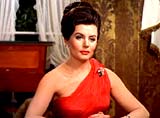 First Bond Girl: Sylvia Trench (Eunice Gayson) in London at Le Cercle Gambling Club 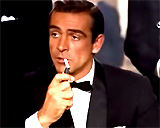 Bond's Trademark Introduction: "Bond, James Bond" 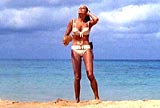 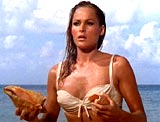 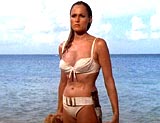 Honey Ryder (Ursula Andress) 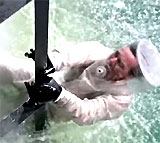 The Death of Dr. No (Joseph Wiseman) |
|||||||||||||||
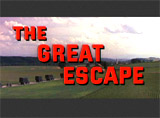
|
The Great Escape (1963) This WWII prison-camp escape action-film and box-office champ from John Sturges was a critically-acclaimed, epic film about the building of a tunnel in 1943 for a 'great escape' (based on a true story) from the Stalag Luft North German POW camp. It was based on Paul Brickhill's 1950 factual account of the true story of 76 Allied servicemen POWs during World War II who escaped from Stalag Luft Nord III in Germany. This "great escape' was the largest mass escape during the war. The war film was enhanced by a stirring musical score by Elmer Bernstein. The escapist adventure film told about an all-star group of Allied prisoners (American, Canadian, Scottish, Australian and British), starring Steve McQueen as Allied POW loner Captain Virgil "Cooler King" Hilts, and others including James Coburn, Richard Attenborough, Charles Bronson, Donald Pleasence and James Garner. There were no female characters, and director Sturges had worried that it would be a difficult film to market. The film opened in late 1942 at a new Allied POW 'escape-proof' camp, where the Third Reich had moved all of its prisoners who had attempted to escape captivity. The film's central character was "hot-shot pilot" USAAF Captain Virgil "Cooler King" Hilts (Steve McQueen) - an irreverent Allied POW loner, who was shot down, imprisoned, and had developed a troublesome reputation for 18 numerous attempts to escape from prison camps. Hilts complained and explained to prison-camp officer Strachwitz (Harry Riebauer) that his baseball had rolled under a barbed-wire perimeter fence ("But my baseball rolled over there. How am I gonna get my baseball?") - although he was actually testing the prison camp's defenses - and as a result, he received a barrage of machine-gun fire to stay clear; the officer had warned: "You fool! To cross the wire is death!...The warning wire! It's absolutely forbidden to cross it. You know that"; then, Hilts admitted the real truth to superior Luftwaffe Commandant von Luger (Hannes Messemer): "I was trying to cut my way through your wire, because I wanna get out" - he turned over his wire cutters, and then insolently noted: "I haven't seen Berlin yet, from the ground, or from the air. And I plan on doing both before the war's over"; Hilts was punished with twenty days of isolation in "the cooler" for rule-breaking and for being irreverent and "ill-mannered." During Hilts' "cooler" punishment, he wiled away the time by tossing a baseball against the concrete wall and catching it with his mitt. There were meticulous plans for a mass escape from the high-security POW camp, by the construction of three different tunnels (nicknamed "Tom," "Dick," and "Harry"), just in case, to provide a way out for about 250 of the prisoners; the effort was organized and led by RAF Squadron Leader Roger Bartlett (known as "Big X") (Richard Attenborough); fortunately, the defiant Bartlett had been imprisoned with "every escape artist in Germany" - a team of experts all with descriptive nicknames: "The Scrounger," "The Manufacturer," "The Tunnel Kings," and "The Tailor," among others. In the scene of the demise of Scottish RAF Flying Officer Archibald "Archie" Ives (Angus Lennie) (nicknamed "The Mole"), he had become so desperate when the main escape tunnel "Tom" was discovered, that he walked in a daze to the barbed wire surrounding the camp, climbed up in full view of guards, and was shot dead (Hilts was too late in saving him); Hilts was motivated to inform Bartlett that he would now agree to engage in a reconaissance mission: "Sir, let me know the exact information you need. I'm going out tonight."
A breakout in the spring of 1944 through the completed "Harry" tunnel was partially successful; but the tunnel hadn't been dug long enough - there was a miscalculated gap of about 20 feet from the tunnel to the forested woods; however, 76 escapees made it out during an air raid blackout with Hilts' rope-signal to help escapees know when the coast was clear. The fate of Hilts once he escaped became the film's most memorable and well-known scene; Hilts (actually stuntman Bud Ekins) stole a German soldier's motorcycle (a Triumph TR-6 Trophy 650CC, actually a British model and not a German made BMW) by stringing a wire across a rural road; on his way toward neutral Switzerland, he came upon a German roadblock or checkpoint; he kicked a German officer and then made an exciting, daring cross-country escape across some farmland when cornered; he attempted to vault over the first of two six-foot barbed-wire/wooden fences at the German-Swiss border, but before he was able to jump the higher second-line fence, his motorcycle was shot from under him, and he become entangled and ensnared - and was captured.
In the closing scene, Hilts was dramatically brought back to prison in handcuffs, where he was told by the recently-relieved Commandant, Luftwaffe Colonel von Luger (due to having failed to prevent the breakout), that he was "lucky" because "fifty" other POW friends of his who had been recaptured were murdered by orders of Hitler (under the pretense that they were trying to escape); the Commandant added: "It looks, after all, as if you will see Berlin before I do." Hilts was returned to the "cooler," where he was again heard by the guard, who paused to listen to him endlessly bounce a baseball against his cell wall into his mitt, presumably planning his next escape. The film's epilogue was a final dedication to the "Fifty" who had lost their lives: "This picture is dedicated to the fifty," followed by THE END.
"It is the sworn duty of all officers to try to escape. If they can't, it is their sworn duty to cause the enemy to use an inordinate number of troops to guard them, and their sworn duty to harass the enemy to the best of their ability."
The image of Hilts, in a prison cell, endlessly bouncing a baseball against a wall into his baseball mitt. Hilts' exciting (yet ultimately unsuccessful) attempt (actually stuntman Bud Ekins) to escape from the Germans by vaulting a stolen German motorcycle over a second six-foot barbed-wire/wooden fence at the Swiss border. |
 Hilts Questioned by Prison Camp Officer Strachwitz (Harry Riebauer) 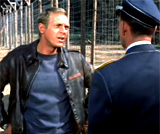 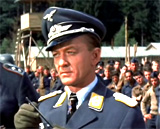 Hilts Punished by Luftwaffe Commandant von Luger (Hannes Messemer) 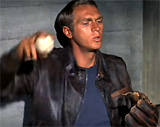 Punished In the Cooler, With His Baseball Mitt 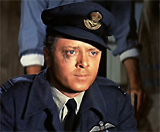 RAF Squadron Leader Roger Bartlett (Richard Attenborough) 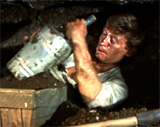 Secretly Digging One of the Tunnels  Hand-Cuffed Hilts Back at the Prison, and the Commandant's Words: "It looks, after all, as if you will see Berlin before I do" 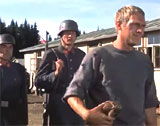 Hilts Returned to the "Cooler" 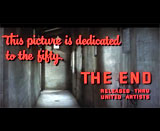 Film's Dedication |
|||||||||||||||
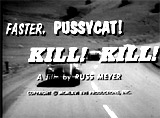
|
Faster, Pussycat! Kill! Kill! (1965) Sexploitation films always did well with male audiences in grindhouse theatres, featuring fast cars, catfights, shapely outlaw females, go-go dancing, murder, and karate. 'King of the Nudies' director Russ Meyer's best and most popular work was this overly dramatic, trashy, semi-fantastical, and violent (but without overt nudity or extreme bloodshed) film that originally failed at the box office. The cult favorite was considered hard-core in its day. Its tagline was:
Although a flop and initially reviled by feminists as "juvenile sexism," it has often been interpreted and reassessed as a pro-feminist "female empowerment" epic. In its gender reversal, the female characters were seen as fierce, cunning, powerful, supercharged, aggressive and sexually predatory, while the males were either weak, decrepit, sexually impotent or mindless brutes. The very nasty, trashy crime thriller starred three buxom go-go dancers by night who went on a murderous California desert rampage by day in their drag-racing, hot-rod sports cars:
The trio encountered a young couple on the salt flats: Tommy (Ray Barlow) and his timid, naive bikini-clad girlfriend Linda (Susan Bernard, December 1966 Playmate); cleancut racer boyfriend Tommy competed on the salt flat race track against Varla and the others (he lost when he was run off the track by a cheating Varla and spun out); afterwards when Tommy objected and Varla suggested they fight, Varla karate-chopped him in the side and in the neck and lethally back-crunched and spine-cracked him; Linda fainted from shock after witnessing the murder - and then was kidnapped, drugged and taken hostage-captive. At a gas station, while the dumb attendant (Mickey Foxx) cleaned Varla's windshield, he said he wanted to 'see' America - as he stared down at Varla's bounteous chest: "Just passing through, huh? Boy, that motor's sure hot! You gals really must have been moving on these little machines. Yes, sir, the thrill of the open road. New places, new people, and new sights of interest. Now that's what I believe in, seeing America first!"; Varla memorably growled back: "You won't find it down there, Columbus!" The group (with hostage Linda) followed a truck to the dilapidated ranch of a crippled, wheel-chair bound rich "Old Man" (Stuart Lancaster), the lecherous father of muscle-bound, dim-witted Vegetable (aka "Veggie") (Dennis Busch) and his more normal older son Kirk (Paul Trinka); their intent was to steal the lascivious old man's alleged inheritance money stashed somewhere at the ranch.
With the "Old Man's" encouragement, Billie attempted to seduce the shirtless and clueless Vegetable, who was lifting weights, and she became increasingly frustrated at him. Meanwhile, Linda ran off and tried to escape, but was brought back to the ranch by Kirk. Varla also attempted to seduce the older son Kirk as a means to finding the hidden money; again, Linda escaped and there was a race to recapture her. Vegetable and the "Old Man" were the first to find her - Vegetable tackled her, and then with his father's encouragement, he approached Linda to rape her, but then apologized and backed off from assaulting her; Kirk arrived and announced that he would take Linda home (on foot), and then promised that he would take care of the two "kooks" (his degenerate brother and father); Varla was incensed that Kirk was showing protective and loving behavior toward Linda as he walked her away.
Back at the ranch, a revived Billie told Varla and Rosie that she disagreed with their plan to kill the "Old Man," Kirk, Vegetable, and Linda, to cover their tracks; Billie vowed to leave them: ("Well, I hate to break up the act, girls, but I always did want to do a single. See you in church, huh?"); as she was walking away, Varla threw Rosie's switchblade knife a long-distance into her back as she cried out: "Much later, filly!" - Billie staggered and arched backward before falling dead to the ground. In the film's violent conclusion, with Varla in the car, Rosie ran down and killed the crippled "old man" in his wheelchair (revealing the hidden money that flew out of the seat of the capsized wheelchair), because he was a witness to Billie's murder. When Rosie went to retrieve her knife from Billie's back, Vegetable assumed that she was responsible for Billie's death and he knifed her to death ("I'll give you the knife") - with three vicious stabs to her abdomen - and she fell dead at his feet ("Your knife is yours to keep now") near Billie's dead body. When Varla saw her girlfriend Rosie dead with stab wounds, she vengefully ran down Vegetable and partially pinned and crushed him with her car against a wooden fence. Out in the desert after Varla caught up to Kirk and Linda, during hand-to-hand combat between them, Varla was gaining the upper-hand until Linda smashed into her with the ranch's jeep-truck and she soon died (with a clenched fist in the air about to strike).
Afterwards, Linda cried out hysterically: "I killed her like she was an animal. Like she was nothing!" - Kirk responded: "She was nothing, nothing human! A real Jekyll and Hyde. You saved my life, so stop cryin', huh?" As they were leaving, Linda asked: "Are you gonna just leave her there?", Kirk coldly replied: "Well, she's not goin' anywhere" - the film's last line. |
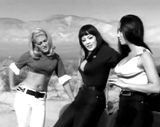 The Three Pussycats 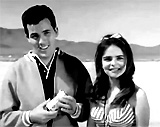 Tommy (Ray Barlow) and Linda (Susan Bernard) on Salt Flats  Linda Witnessing Tommy's Murder 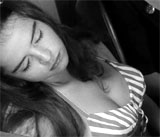 Linda Drugged, Kidnapped and Taken Hostage 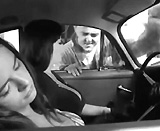 Gas Station Attendant: Staring at Varla's Chest 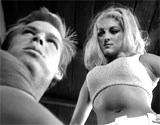 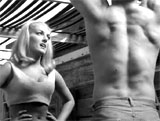 Billie Attempting to Seduce Vegetable - As He Lifted Weights 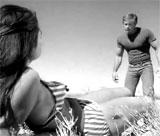 Vegetable's Threatened Rape of Linda, Egged on by the "Old Man" 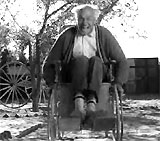 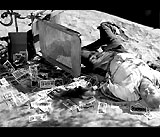 Rosie's Murder of Wheel-Chaired "Old Man"  Vegetable's Knifing of Rosie 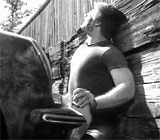 Varla Pinning and Crushing Vegetable Against Wooden Fence |
|||||||||||||||